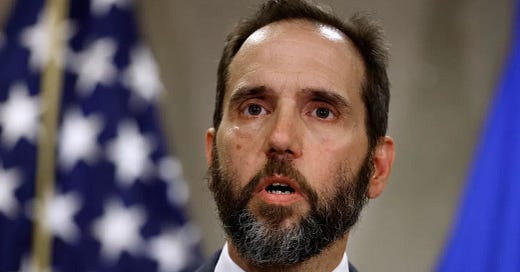On Monday Jack Smith moved to end the federal prosecutions of Donald Trump. In the D.C. case, which was based on the efforts to overturn the 2020 election, Smith moved to dismiss the indictment without prejudice and Judge Chutkan promptly granted the motion. In the Florida case based on the improper retention of classified materials at Mar-a-Lago, Smith moved to drop Trump from the appeal pending before the 11th Circuit and the court granted that motion as well. Judge Cannon had already dismissed that case without prejudice (which was the basis for the appeal) so removing Trump from the appeal simply has the effect of leaving that dismissal in place.
Special Counsel Jack Smith
This is an extremely troubling and discouraging development, of course, but it was inevitable once Trump won the election. The dismissals were required by the longstanding Justice Department policy that a sitting president cannot be prosecuted. Even if dismissal had not been required, Trump certainly would have had the cases dropped once he took office. As I wrote shortly after the election, the federal cases were doomed by Trump’s victory. All that remained was to learn the details of the funeral arrangements.
The dismissals are without prejudice, which means that theoretically the cases could be brought back once Trump is out of office. I don’t think anyone should really expect that to happen. Assuming Trump serves his full four-year term, I don’t know how much legal or political appetite there would be to resume the prosecutions in 2029, continue the fights and appeals over presidential immunity, and perhaps get the cases to trial when Trump is 85 or so.
An additional hurdle would be the five-year statute of limitations. For crimes that occurred in 2021 and 2022, the statute of limitations will have run by the time Trump leaves office. In his D.C. motion to dismiss Smith floated the idea that a judge might agree to pause, or “toll,” the statute of limitations because Trump could not be prosecuted while in office. But although equitable tolling of statutes of limitations in civil cases is not uncommon, it’s not clear the doctrine applies in criminal cases absent any express statutory authority. In criminal prosecutions statutes of limitations are part of the due process protections accorded defendants, to protect them from prosecution based on too-distant events.
Congress could have passed a law providing that the statute of limitations against a president is paused while he or she is in office, but it hasn’t done so. And it can’t pass one now (not that this Congress would, or that Trump would sign it) and have it apply retroactively to Trump due to the constitutional prohibition against ex post facto laws.
So although some are clinging to the hope that maybe the cases aren’t really over, I don’t think that hope is realistic. It’s a bitter pill to swallow, but the die was cast once the voters chose to put Trump back in office.
Smith made it clear in his motions that the special counsel fully stands behind the merits of these prosecutions. They aren’t being dismissed because of any problems with his evidence or legal theories. It’s strictly because Trump will be president and allowing the criminal cases to proceed would unduly interfere with his duties.
What About Trump’s Co-Defendants?
In the Florida case Smith is seeking to reverse Judge Cannon’s decision that the appointment of the special counsel was unconstitutional. Trump had two co-defendants in that case, Walt Nauta and Carlos De Oliveira, who were charged with conspiring with Trump to obstruct the investigation into the classified documents. Smith did not move to drop the 11th Circuit appeal as to them, so the appeal is still alive for now. But I would expect that once Trump takes office he will have his Attorney General drop the appeal and/or will pardon Nauta and De Oliveira.
That will mean Cannon’s decision about the unconstitutionality of special counsels will stand. That might be fine with the Trump Justice Department. But in any event, it is just the decision of a single district judge. It is not binding precedent in any other court, not even for other district court judges in Florida. It can remain as an isolated outlier.
Why Dismiss the Cases Now?
Part of me had hoped Smith would not drop the cases or leave office voluntarily but would force Trump to dismiss the cases and fire him after taking office. That would at least establish for history that he was the first president and defendant to order that his own criminal prosecutions be dismissed. One of Trump’s first official presidential acts would be to obstruct justice. Why make it easier for him and do it now?
I think the likely answer is that dropping the cases now makes it easier for Smith to prepare a final report before Trump takes office. Special counsels are required to prepare a confidential report for the Attorney General once their investigations are concluded — you probably recall the Mueller report from Trump’s first term. The Attorney General may then decide to make that report public. Merrick Garland has generally favored the public disclosure of such reports.
Now that the cases are officially over, Smith can prepare a detailed report on what he found in both cases and present it to Garland in time for it to be made public before Trump takes office. If the cases were still pending there would not be a basis for preparing a final report. Once Trump took office he would drop the cases anyway, and then the likelihood of any of Smith’s findings being made public would be probably be zero.
I think having Smith’s report is important for the historical record. It’s not clear how much new information will be revealed, since a great deal about the facts of both these cases is already public knowledge. But now that the cases will not be concluded, I do think it is important for Smith to create a detailed public record of what he found. Presumably that is the plan and Garland will release the report before Trump takes office.
What About the State Cases?
Smith’s actions do not directly affect the state prosecutions in Georgia and New York. The Georgia case remains bogged down in appeals over whether DA Fani Willis should have been disqualified. The Georgia Court of Appeals recently canceled, without explanation, the December 5 oral arguments in that appeal. It’s hard to read those tea leaves. The court apparently decided oral argument would not be helpful, but that doesn’t tell us which way the court is leaning.
If the Court of Appeals disqualifies Willis the case goes back for potential reassignment to a new prosecutor. Given the politics in Georgia that might never happen, or the new prosecutor might decide to drop the case. If prosecutors survive the appeals, the case potentially could go to trial against the other defendants, without Trump. Given the size of the case and number of issues that would almost certainly be at least a year or two away.
In New York, as I wrote here, it is still possible for Judge Merchan to sentence Trump on his thirty-four felony convictions before he takes office.
Merchan has set a deadline of December 9 for all briefs to be filed concerning Trump’s motions to dismiss based on presidential immunity and the fact that he won the election. That’s a fairly quick timeline that would still make it possible for Merchan to deny the motions and have a sentencing hearing before January 20. As I argued in that post, the judge could suspend the execution of any sentence until after Trump leaves office, and appeals could proceed with no real impact on Trump’s duties. I don’t know how likely this is — probably not very — but it remains an option.
The bottom line is there is not much good news when it comes to seeing Trump held accountable for his criminal conduct. The best we can do now is watch to see what happens in New York and look for a report from Jack Smith.







I hope this summary is widely disseminated. It really gets into the legal and practical weeds of how Trump successfully evaded prosecution and how he is probably the only person in American history to pull it off by his own hand. Trump won this round, but Jack Smith's report will be primary source detail for historians, and my bet is that Trump will lose the second round, his legacy, which will expose him as a complete charlatan.